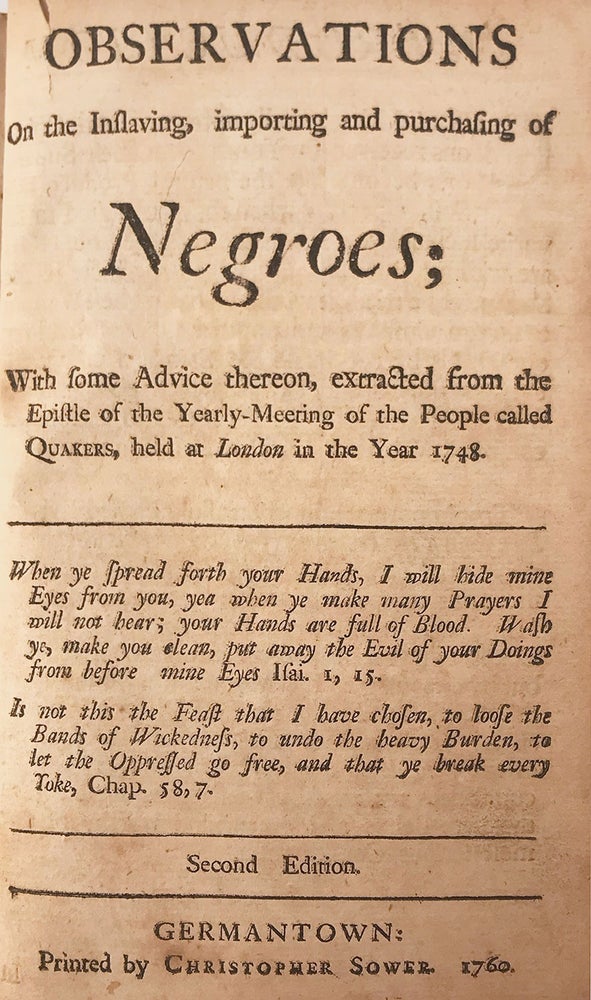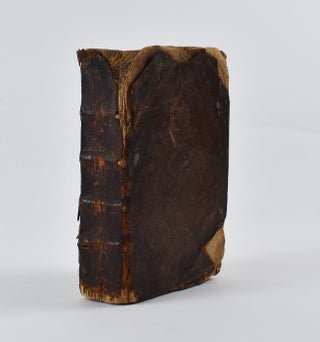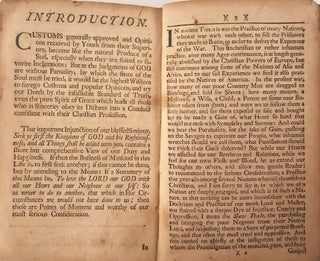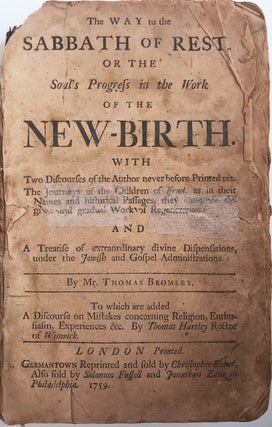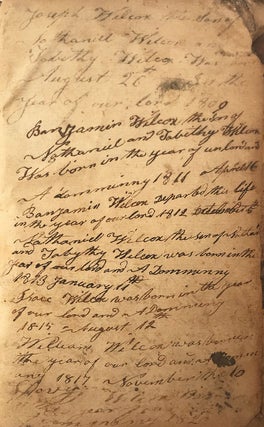Observations on the Inslaving, Importing, and Purchasing of Negroes; With Some Advice Thereon, Extracted From the Epistle of the Yearly-meeting of the People Called Quakers Held at London in the Year 1748. Germantown: Printed by Christopher Sower, 1760. 8vo, full original full calf with single diamond-shaped ornament stamped on each cover. 16 pp.
[Bound in sammelband, as issued, with:] Bromley, Thomas. The Way to the Sabbath of Rest. Germantown, 1759. viii, 1–60 pp.; The Journeys of the Children of Israel. As they Are Recorded, Numb. 33. And in Their Names and Historical Passages Comprise the Great and Gradual Work of Regeneration; In Which Discourse Our Various Straits and Succours in the Spiritual Wilderness; Our Encounters With, and Victory Over Sin and Satan, Are Distinctly Represented. And All Proportion’d to the Truth of Experience and Internal Teaching; as These Correspond With the Authentick Suffrage of the Holy Scriptures. [no imprint, paginated with the preceding] [61]–187 pp.; An Account of the Various Ways of God’s Manifesting Himself to Man. With Observations on Those Dispensations Call’d Extraordinary. [no imprint, paginated with the preceding] [188]–280 pp.; Hartley, Thomas. A Discourse on Mistakes Concerning Religion, Enthusiasm, Experiences, &c. London Printed. Germantown reprinted by Christopher Sower, 1759. 71, [1 blank] pp.; Dell, William. Christ’s Spirit, A Christian’s Strength. Or, a Plain Discovery of the Mighty and Invincible Power, That All Believers Receive Through the Gift of the Spirit. First Held Forth in Two Sermons, on Acts I, viii. And After Published for the Instruction and Use of Those That Are Spiritual, Anno MDCXLV. Germantown: Printed by Christopher Sower, 1760. [73]–168 pp. With late eighteenth and early nineteenth century ownership inscriptions of various members of the Wilcox family of Delaware on both the front and rear endapers. CONDITION: Worn with losses to calf at corners and edges, particularly to the front cover, upper inside corner of text block chewed, but with no effect on printing; first title page torn in half horizontally with document repair tape holding the two halves together and also worn with some loss and creasing at edges; occasional dampstains throughout. Second edition of this important pre-Revolution abolitionist text by “the single most prolific antislavery writer and the most influential advocate of the Negro’s rights on either side of the Atlantic,” published a year after the first edition and appearing both separately and, as here, in a sammelband with various other Quaker tracts, all printed by Christopher Sower. The text draws from five accounts of what, to a general Anglo-American audience, would be a “behind the scenes” look at the slave trade. Benezet’s stated aim is that “every Purchaser,” who in buying slaves encourages the trade and “becomes partaker in the Guilt of it,…may see what a deep dye the Guilt is of.” The extracts cover Europeans’ instigation and facilitation of African wars for their own gain, the inhumane treatment of those captured or deceived into slavery, and the suffering of communities and families torn apart. Benezet closes with concise summaries of the harm that slavery and the slave trade inflict on all levels of society, and a round refutation of the hollow arguments used to prop them up. Anthony Benezet (1713–1784), born to a Huguenot family driven from France after revocation of the edict of Nantes, emigrated to Philadelphia at age 17 and, after joining the Society of Friends, went on to become one of America’s most influential abolitionists both within and beyond the Quaker community. He founded America’s first abolitionist society, The Society for the Relief of Free Negroes Unlawfully Held in Bondage, in 1775. An educator by profession, Benezet significantly advanced the educational prospects for girls and free Black people in the Philadelphia area: his friendship with his neighbor, Benjamin Franklin, led indirectly to the establishment of several religious schools for Black students. Benezet himself established the colonies’ first all girls’ public school, and, after years of offering free evening courses for Black students at his home, founded the Negro School at Philadelphia in 1770. Benezet’s work to provide African American students with such “religious and literary instruction as would qualify them for the proper enjoyment of freedom, and for becoming useful and worthy citizens” was noted by W.E.B. Du Bois, who wrote that “Anthony Benezet and the Friends of Philadelphia have the honor of first recognizing the fact that the welfare of the State demands the education of Negro children.” Benezet’s circle of influence was wide, and he is especially noted for his impact on British abolitionists, among them Granville Sharp, whose 1772 Somerset case led to slave-owning being outlawed in England; Thomas Clarkson, whose research supported William Wilberforce’s abolitionism, and John Wesley, the founder of the Methodist Church and a widely-read abolitionist author. True to its title, Benezet’s “Observations” was one of the first anti-slavery publications to include eyewitness accounts from traders who had seen the slave trade’s devastating effects in western Africa. It is one of the most important anti-slavery pamphlets published in America before the Revolution. Christopher Sower (sometimes Saur; 1721–1784) of Germantown, Pennsylvania, also an abolitionist, was the second of three generations of printers, his father (also Christopher) having published the second Bible printed in North America after John Eliot’s Indian Bible. Under the son’s direction, the business became one of the largest book manufactories in the colonies. An appealing example of this important abolitionist work in its original binding with other tracts printed by Christopher Sower. REFERENCES: Evans 8542; Sabin 4676; ESTC W28713; “Anthony Benezet,” at PBS online; Hornick, Nancy Slocum. “Anthony Benezet and the Africans’ School: Toward a Theory of Full Equality,” The Pennsylvania Magazine of History and Biography, Vol. 99, No. 4 (1975): pp. 400, 404.
Item #7342
Price: $3,500.00


